Why do Sky struggle to win one-day races?
A look into one of the strongest team's one-day records
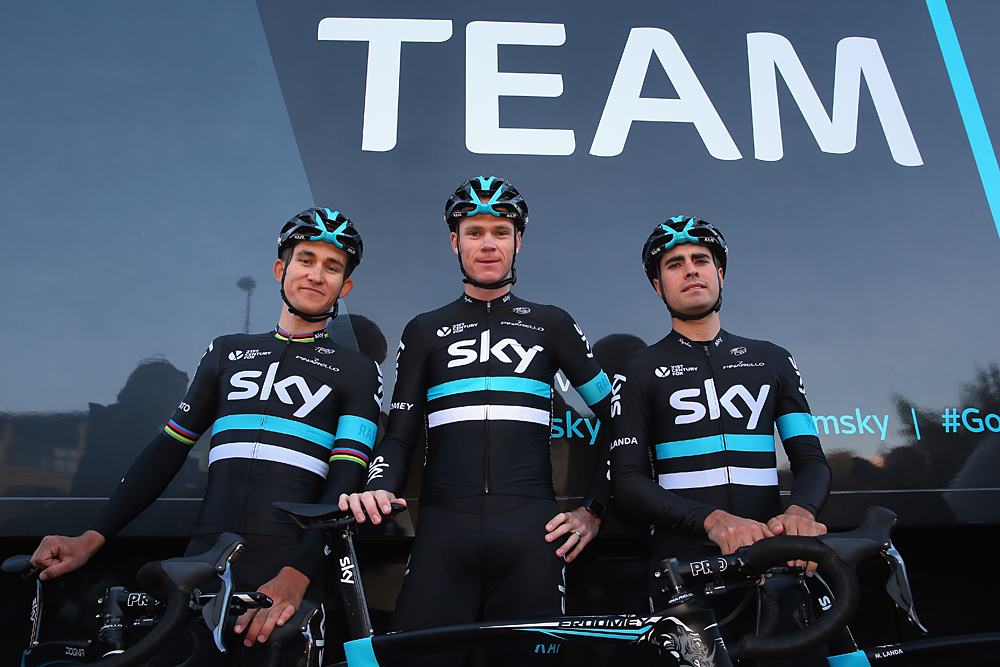
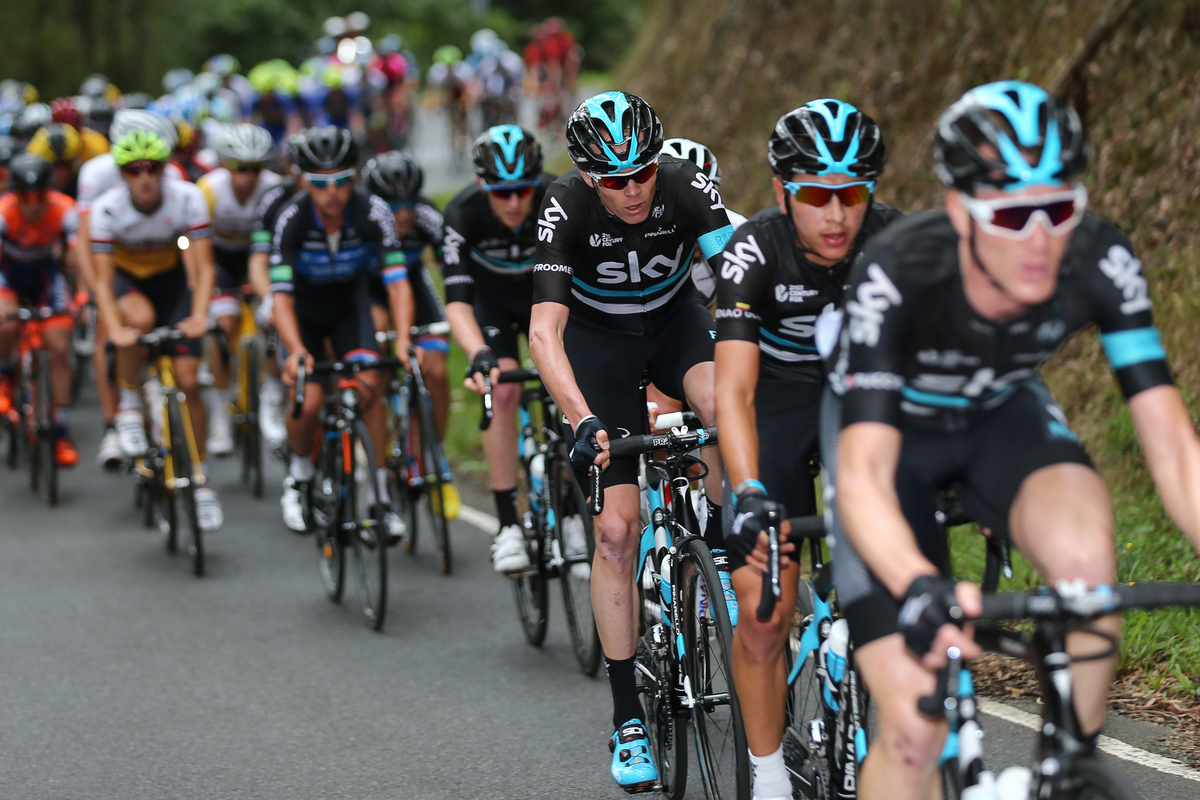
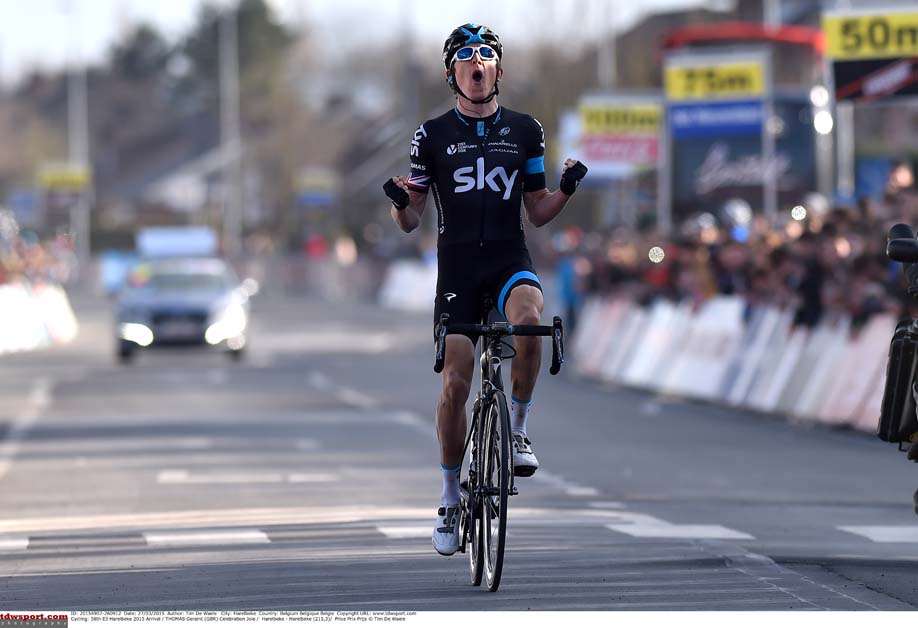
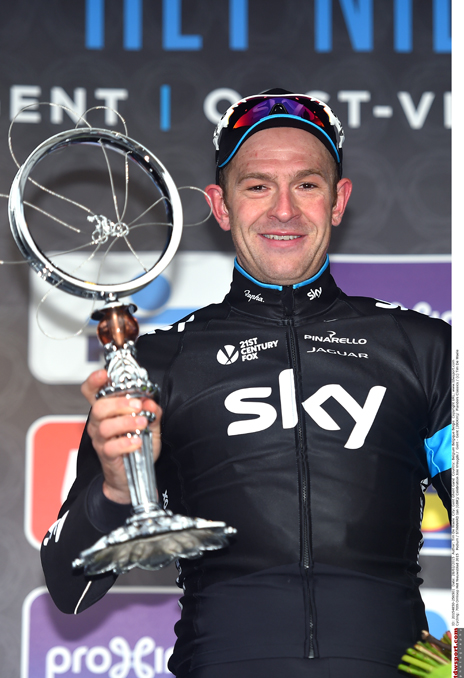
This feature first appeared in Procycling magazine. To subscribe, click here.
They’re probably the strongest cycling team in the world, with three Tour de France yellow jerseys in the last four years and multiple stage race wins, along with well over a hundred stage victories. But their record in one-day races and the Monuments is far less impressive. Procycling asks why.
The first thing to point out is that the headline for this piece is deliberately hyperbolic. Sky can win one-day races. Last year, Ian Stannard, outnumbered in a four-man break at Het Nieuwsblad which was three-quarters full of Etixx riders (with five Paris-Roubaix wins between them), still came out on top. Geraint Thomas was the strongest rider in E3, and won. (He was also the strongest rider in Gent-Wevelgem and didn’t win but that’s cycling.)
However, over the course of their six-year history, Sky have underperformed in one-day races compared to their glittering stage race record. Discount time trials and National Championships (which operate under different tactical conditions from regular international races) and Sky have taken just 13 international one-day races in total. In 2013, they didn’t win a single one. 2014 was barely better – a solitary one-day win from the whole season. It’s no stretch to describe Sky as the strongest cycling team in the world, yet in the last three seasons, they’ve totalled only three international one-day road race wins. [Now four, after Peter Kennaugh won the Cadel Evans road race – Ed.]
To put those numbers into context, Etixx-Quick Step won 12 one-day events in 2015 alone. (It’s also true that Etixx, in their 13-year history, have never once put a rider into the top 10 of the Tour de France.) Some more numbers: Sky have won 37 stage races and 138 stages along the way. But they’ve never won a Monument, peaking in those races with three third places.
The morning that Bradley Wiggins won the Tour de France, Team Sky principal Dave Brailsford sat in a hotel with a group of British journalists. Before his rider had even pulled on the winner’s yellow jersey, Brailsford was thinking out loud about where Sky could improve. “We were sh*t in the Classics,” he said. Three years on, they have won semi-Classics like Het Nieuwsblad and E3 but the Monument duck stands.
Why do Sky seem to struggle to achieve the same level of results in one-day events that they do in stage races and Grand Tours? We’ve identified five reasons, and also found a few reasons they could finally break their Monument duck in 2016.
Get The Leadout Newsletter
The latest race content, interviews, features, reviews and expert buying guides, direct to your inbox!
1 They have other priorities
Sky are so single-minded in finding the best way of winning the Tour de France that they once even left a previous winner at home – Bradley Wiggins in 2014 – in order that Chris Froome could have an unambiguous run at the yellow jersey.
The team’s stated aim at the outset was to harness the knowledge, experience and attention to detail gained from building a world-beating Olympic track racing team and apply it to winning the Tour de France with a British rider, within five years. They did it in three and in doing so built a formidable stage racing team.
What Sky understood from the start is that to resonate with the general British public, they had to win the Tour, so they built a Tour-centred team. A Tour-centred team is by definition good at stage racing. This means that their stage racing record is unimpeachable – any disasters, such as the 2010 and 2014 Tours, are more than offset by the three yellow jerseys, and the other GC wins and stage wins.
The unfortunate and probably inevitable by-product of this is that, whether more committed cycling fans like it or not, the Classics have never been as much of a priority, and nor have major week-long stage races, even the ones that Sky have won. While year-round cycling fans might be impressed by a win at Milan-San Remo or the Tour of Flanders, it would take a yellow jersey to capture the imagination of the general sports public. This is not to say that Sky wouldn’t love to win a Monument, or that they don’t have the talent to do so, but their hiring strategy speaks volumes. There are a lot of diesel climbers at Sky.
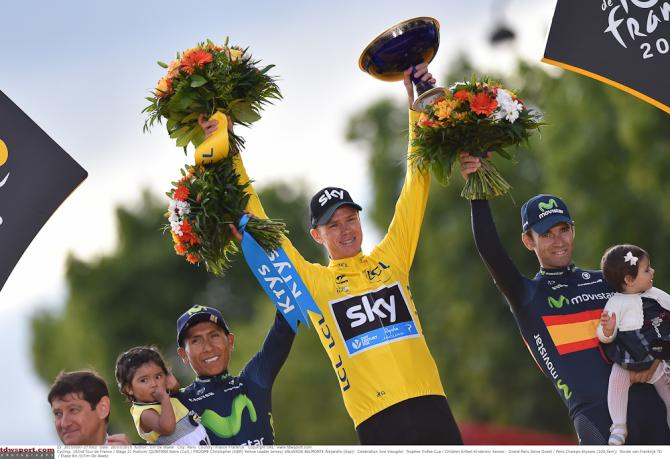
2 They’re structured for stage races
Sky are more comfortable basing their race strategy around single leaders. On paper, they went to the 2012 Tour with ambitions in both the general classification, with Bradley Wiggins, and in the sprints, with Mark Cavendish, but in reality Cavendish was more or less left to get on with it while the bulk of the team effort was directed to the push for the yellow jersey.
Winning the Tour, for Sky, isn’t just a matter of having the strongest leader, it is also having the strongest climbers supporting him in the mountains, and the strongest rouleurs sheltering him from the wind. But the skillset needed to ride like this isn’t easily translated to winning Classics. There comes a point in most Classics, either in the final quarter of the race, or in a punchy finishing sprint up a hill, where riders need zip.
Not many teams can compete for wins in Grand Tours and Monuments. Astana were the only team to win one of each in 2015, with Fabio Aru at the Vuelta and Vincenzo Nibali at Il Lombardia. Movistar and Katusha both won Monuments last year and got riders onto Grand Tour podiums. However, all these teams have leaders who are proven one-day winners. Sky’s roster is based more around strong climber-rouleurs than around punchy sprinters.
3 They have good but not great one-day racers
Sky’s Classics team is actually pretty formidable and when they get it right they can dictate and win one-day races. For the flat Classics Ian Stannard, Geraint Thomas, Luke Rowe and Ben Swift are proven performers. Stannard has won Het Nieuwsblad twice, Thomas has won E3, Rowe finished in the top 10 of Paris-Roubaix last year, and Swift has finished on the podium of Milan-San Remo. In the hilly Classics, Sergio Henao has come second in Flèche Wallonne and fifth in Lombardia, while Lars Petter Nordhaug won the GP de Montréal for Sky in 2012.
All these riders are good, and there can be significant tactical advantages to having this kind of strength in depth. On the most simple tactical level it means one can attack while the others mark the chase. Strength in numbers.
But they are one level below the likes of Fabian Cancellara and Tom Boonen in the flat Classics, and Alejandro Valverde or Joaquim Rodríguez, for example, in the hilly Classics. These riders are guaranteed race winners in the Monuments. Not only that, they tend to ride for teams who also have strength in depth – Boonen sat back two years running at the Tour of Flanders as his rivals watched him, and he watched them, while his teammate Stijn Devolder was up the road winning the race.
In the flat Classics Boonen and Cancellara have dominated for many years. John Degenkolb and Alexander Kristoff, with two Milan-San Remos, a Paris-Roubaix and a Tour of Flanders between them, look like taking over as the outright favourites in these races in the coming years. If Sky could sign a rider of this calibre, they’d win as many Monuments as they do Grand Tours.
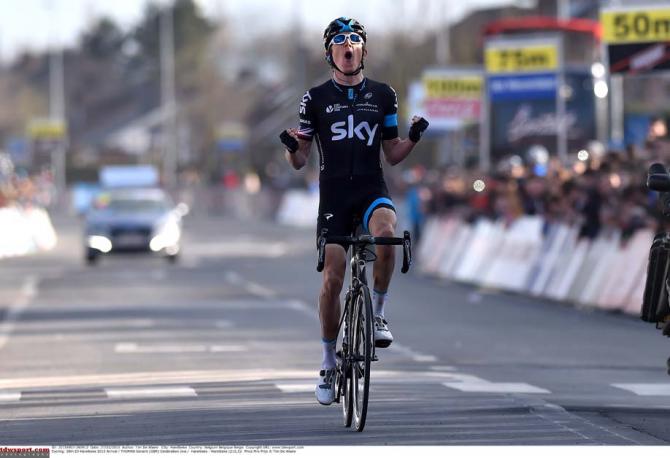
4 One-day races aren’t stage races
In a stage race, Sky suffocate the opposition with their train – a line of strong climbers keeping a fast, steady pace in the mountains. But the demands of one-day racing are different and the tactic of using a train rarely works. Sky have tried to impose these kinds of tactics in one-day races – the 2010 Tour of Flanders is remembered for Fabian Cancellara and Tom Boonen’s long break, and for Cancellara’s win, but look further back in the race and Sky attempted to dictate tactics for a long time. They had riders on or near the front of the bunch for over 100km, setting Mat Hayman up for an attack before the Molenberg. But it was mistimed. When Cancellara and Boonen attacked on the Molenberg itself, Sky were already wasted, but it was on their watch that Cancellara and Boonen’s lead went out to 30 seconds and beyond. If they’d hidden away, and known better where to expend their resources, perhaps they could have closed the gap.
Especially in the Monuments, which are all extremely long, there comes a moment when leaders are simply isolated from their team-mates and have to do their own dirty work of chasing. The real Classics contenders know from years of experience when this is going to happen, and how to profit. In a Tour mountain stage, the physical demands are more predictable, plus chasing is always more regulated – riders are defending fourth or fifth place, or even a place in the top 10, whereas in a Classic, the win is all that counts. There tend to be more teams interested in chasing breaks in a stage race than in a one-day race.
5 The tactical demands are very different
Sky’s record in Paris-Roubaix is actually pretty good. They’ve had a rider in the top 12 every year since 2010 – no other team can match that consistency. But while they always have a rider up there at the front, they don’t seem to be able to close the deal.
Sky’s head of performance operations, Rod Ellingworth, has talked about the need to learn the tactics and parcours of the Classics [see below] in the same way that Etixx, for example, have done. But Sky’s riders have been in a position to win, or at least put themselves in a very strong position to win, at the death of both Roubaix and the Tour of Flanders, but been affected by some kind of tactical brain freeze.
In Paris-Roubaix 2014, both Geraint Thomas and Bradley Wiggins made the decisive 11-man selection through the Carrefour de l’Arbre cobbled sector. Peter Sagan, John Degenkolb and Tom Boonen were in the group, so if it had come down to a sprint, these three would be the likely podium. But Boonen and Degenkolb also had team-mates in the shape of Niki Terpstra and Bert De Backer. This was crucial and Sky should have known it. Terpstra attacked, and De Backer wasn’t up to the task of chasing, which allowed Terpstra to stay away and win. One of Thomas and Wiggins should have marked the attack, and while it wouldn’t have been a foregone conclusion in the sprint, they would have achieved a much better result than seventh and ninth. A similar thing happened in the 2010 Flanders, when Thomas and Juan Antonio Flecha were in the final selection of 12 riders, and came 10th and 11th.
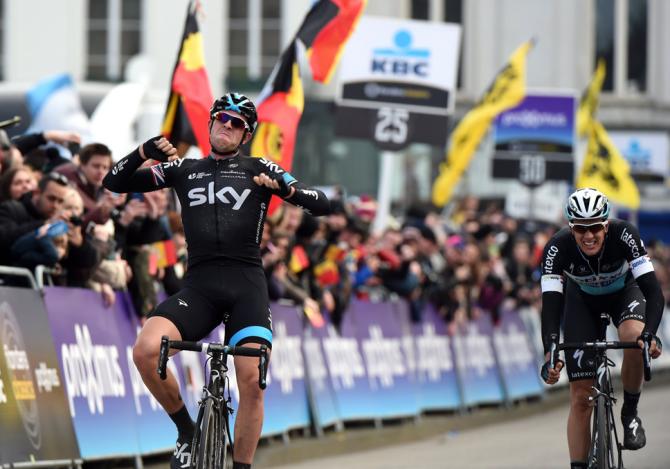
THE GOOD NEWS
Does it matter that Sky are hugely successful in stage races and less so in one-day races? It’s up to the team management to set their priorities and organise their performance. The team was born out of the British Cycling system of identifying targets and controlling the controllables, and the simple fact is that stage races are more controllable than one-day races. Of course Sky are better at stage racing.
The team usually has a presence at the front of the Monuments and Classics. Geraint Thomas won E3 last year, and was in at the kill at Milan-San Remo and Gent-Wevelgem. Thomas broke away before the Poggio in Milano-San Remo, was away alone up the climb, and was still first over the top. If the chase had faltered, you could say he wasn’t far off winning, although tactically, you know the chase up the Poggio rarely falters, especially with a solo break.
Sky have also considerably beefed up their chances in the hilly Classics by signing Michał Kwiatkowski, and this could be the biggest admission that while developing systems and organising strategy is all well and good, the most important thing you need to win races is a race winner. Kwiatkowski is a former world champion and he won Amstel Gold last year.
But the Tour will remain their priority, and looking at the variety of races on the calendar, and the number of riders a WorldTour team is allowed to have (a maximum of 30), something has to give. It’s close to impossible to compete in GC, sprints and one-day races over the whole season, and Sky’s compromise until now has been one-day races.
Will Sky win a Monument in 2016? Will they improve on their previous comparatively poor results in one-day races? While they are not far off, the bigger question for the management will be, can they realistically aim to do these things while guaranteeing their performance in the (to them) more important races, and especially the Tour de France? It says a lot about the reality of modern cycling, where no team can dominate in every field, that even the best cycling team in the world can’t be the best at everything.
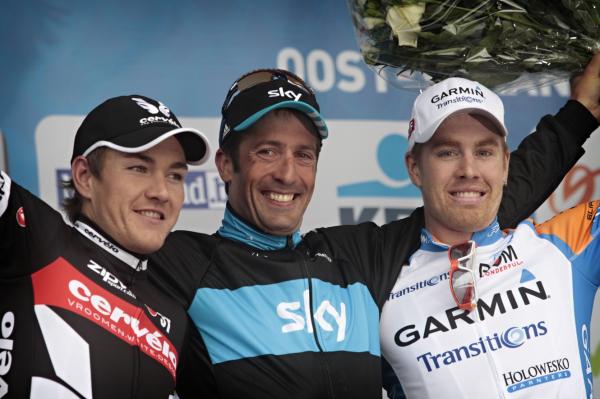
Q&A: ROD ELLINGWORTH
Procycling asks Sky’s head of performance operations, Rod Ellingworth, why the team has less success in one-day races than stage races
Procycling: How close are you to winning a Monument?
Ellingworth: I think we’re getting close. G [Geraint Thomas] has won E3. We were happy with that. Ian [Stannard]’s Het Nieuwsblad win was great and we’ve won Kuurne-Brussels-Kuurne a couple of times. It’s a case of getting it right on the day but it’s not for lack of trying.
How would you assess Sky’s performance in one-day races since the team started?
I think we often have our guys on form but race knowledge is another thing. Take Etixx, who have grown up where the races happen. That makes a difference and we’re trying to catch up in terms of race knowledge and the demands of the parcours. We’ve gone well on a few occasions and the guys give their best. Tactically sometimes you get it wrong, so it’s a mix.
Does it matter that you win fewer one-day races?
We’re a WorldTour team and we go into every race with a plan to try and win it. Of course, every time you don’t win, you ask what has happened and look at it. I think we have been committed to our group of riders for the Classics and we’re still prepared to give them a good opportunity to try and win them. So it does matter. These are some of the biggest bike races in the world, and people in the team are excited about them.
Why does the team not win many one-day races?
They are hard to win, aren’t they? Any race is hard to win. The difference is that it can come down to one mistake in a one-day race, and you’ve got no time to put it right. A great example was Chris’s win in the Dauphiné. With a couple of stages to go you’d say he wasn’t going to win but he fought hard, was determined, and pulled the result around. There are more opportunities to put things right in a stage race.
Is it possible to maintain the Grand Tour and stage race-winning ability of the team, and build an equivalent one-day team?
One of the difficult things is that with the race programme and the number of riders you have, there is a compromise. Look at Etixx – they’re great at Classics, not so good at the Tour. Hardly any teams can win everything. We don’t fill our roster with really punchy race winners. When you look at Etixx they rack up the wins because they have that kind of rider. We go a different way but we still go full-on for the Classics and try to win them. If Stannard, Geraint or Luke pulled off a Classic, it would be a great story and that is our dream. In six years we’ve won three Tours, and some teams go their whole lifespan and don’t win a Grand Tour. But the Classics are a huge challenge and that makes it interesting. Personally, I love the Classics and I love being around them and working with the lads.
Sky's one-day wins
| Header Cell - Column 0 | Header Cell - Column 1 |
|---|---|
| 1 | Het Nieuwsblad, Juan-Antonio Flecha |
| Row 1 - Cell 0 | Dutch Food Valley Classic, Edvald Boasson Hagen |
| 2011 | Kuurne-Brussels-Kuurne, Chris Sutton |
| Row 3 - Cell 0 | Vattenfall Cyclassics, Edvald Boasson Hagen |
| Row 4 - Cell 0 | Paris-Bourges, Mat Hayman |
| 2012 | Trofeo Deia, Lars Petter Nordhaug |
| Row 6 - Cell 0 | Kuurne-Brussels-Kuurne, Mark Cavendish |
| Row 7 - Cell 0 | GP Ouest France-Plouay, Edvald Boasson Hagen |
| Row 8 - Cell 0 | GP de Montréal, Lars Petter Nordhaug |
| Row 9 - Cell 0 | Gran Piemonte, Rigoberto Urán |
| 2013 | - |
| 2014 | Het Nieuwsblad, Ian Stannard |
| 2015 | Het Nieuwsblad, Ian Stannard |
| Row 13 - Cell 0 | E3 Harelbeke, Geraint Thomas |
| 2016 | Cadel Evans Great Ocean RR, Peter Kennaugh |
| Header Cell - Column 0 | MILANO-SAN REMO |
|---|---|
| 2010 | Juan Antonio Flecha, 18th |
| 2011 | Edvald Boasson Hagen, 30th |
| 2012 | Edvald Boasson Hagen, 25th |
| 2013 | Ian Stannard, 6th |
| 2014 | Ben Swift, 3rd |
| 2015 | Ben Swift, 13th |
| Header Cell - Column 0 | TOUR OF FLANDERS |
|---|---|
| 2010 | Mat Hayman, 13th |
| 2011 | Geraint Thomas 10th |
| 2012 | Edvald Boasson Hagen 19th |
| 2013 | Edvald Boasson Hagen, 17th |
| 2014 | Geraint Thomas, 8th |
| 2015 | Geraint Thomas, 14th |
| Header Cell - Column 0 | PARIS-ROUBAIX |
|---|---|
| 2010 | Juan Antonio Flecha, 3rd |
| 2011 | Juan Antonio Flecha, 9th |
| 2012 | Juan Antonio Flecha, 4th |
| 2013 | Bernhard Eisel, 12th |
| 2014 | Geraint Thomas, 7th |
| 2015 | Luke Rowe, 8th |
| Header Cell - Column 0 | LIÈGE-BASTOGNE-LIÈGE |
|---|---|
| 2010 | Simon Gerrans 11th |
| 2011 | Rigoberto Urán, 5th |
| 2012 | Lars Petter Nordhaug 20th |
| 2013 | Sergio Henao 16th |
| 2014 | Nathan Earle 70th |
| 2015 | Sergio Henao 7th |
| Header Cell - Column 0 | IL LOMBARDIA |
|---|---|
| 2010 | Serge Pauwels 24th |
| 2011 | Rigoberto Urán 19th |
| 2012 | Rigoberto Urån, 3rd |
| 2013 | Dario Cataldo 22nd |
| 2014 | Vasil Kiryienka 47th |
| 2015 | Mikel Nieve 6th |
This article appears in the current edition of Procycling magazine, February 2016. To subscribe click here.